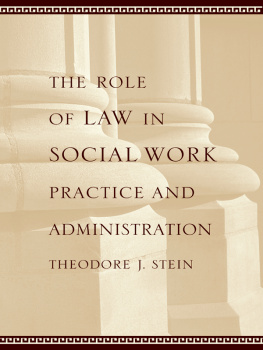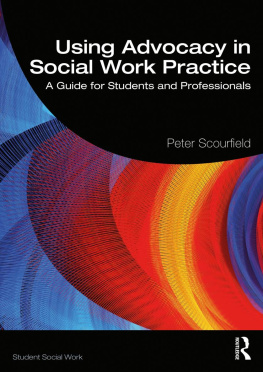The Role of Law
in Social Work Practice
and Administration

The Role of Law in
Social Work Practice
and Administration

Theodore J. Stein

COLUMBIA UNIVERSITY PRESS

NEW YORK


Columbia University Press
Publishers Since 1893
New York Chichester, West Sussex
cup.columbia.edu
2004 Columbia University Press
All rights reserved
E-ISBN 978-0-231-51809-3
Library of Congress Cataloging-in-Publication Data
Stein, Theodore J.
The role of law in social work practice and administration / Theodore J. Stein.
p. cm.
Includes bibliographical references and index.
ISBN 0-231-12648-4 (cloth : alk. paper)
1. Social workersLegal status, laws, etc.United States. 2. Social service
United States. I. Title.
KF3721.S74 2004
344-7303132dc22
2003068810
A Columbia University Press E-book.
CUP would be pleased to hear about your reading experience with this e-book at .

To my family: Gary, Gus, Sheila, Dianna
Angela, Melanie, Vince, Tony, Julie, Jake, and Fern


FIGURES
New York Digest Headnotes
Reading Cases: An Example
Legislation Introduced into the House of Representatives
Reading Statutory Citations: An Example
Confidential Communication
Privileged Communication
A Request to a Court to Release Confidential Information
Confidentiality and Release of Clinical Records
Litigation Against a Social Worker
Neglect Petition
Judicial Surrender
Petition: Termination of Parental Rights
TABLES
Hierarchy of Federal and State Courts
Wests National Reporter System
Common Elements of Child Abuse and Neglect Reporting Laws
Court Hearings

THIS BOOK is about social work and the lawthe ways in which the law affects the day-to-day practice of social work; the creation, administration, and operation of social service agencies; and the ways in which social workers and attorneys collaborate to serve those in need. Written primarily for social work students and professionals, the material may be helpful to any professional who works with individuals, families, groups, and communities to prevent or resolve the myriad problems that result from poverty, discrimination, family violence, and physical and emotional disabilities, as well as those who administer social service programs.
Whether you practice in the public or not-for-profit sector, whether you conceptualize your practice with reference to populations servedthe elderly or children, for exampleor to problems that your clients confront, such as homelessness, hunger, inadequate health care, substance abuse, or mental illness, the law will affect the work you do. The effect can be all-encompassing, as when the agency for which you work is chartered or licensed by the state and the policies that direct your practice are set by federal and state legislators who allocate funds to support your work. Private practice involves a great deal of autonomy but is also affected by the law, which may require you to disclose information that you regard as confidential, because the information suggests that someone faces imminent danger of injury. The law also determines the conditions under which a client can sue you for malpractice, and it establishes rules governing third-party payments from a public or private insurer for the services that you render.
Some social workers are employed directly by the courts, law enforcement agencies, or law firms; others are members of multidisciplinary teams that include attorneys, medical and mental health professionals, accountants, and members of the clergy.
In addition to focusing on the relationship between the professions of social work and law, my objective is to help you develop the knowledge that you will need to practice in a legal environment. To accomplish this objective I have divided the book into three parts.
.
The first three chapters of addresses professional liability, including the conditions that create the potential for malpractice liability and the conditions that provide social workers with immunity from suit.
The first five of the seven chapters in I review two types of family violence: domestic violence, which concerns violent acts between adults who are in an intimate relationship, and the abuse of elderly family members by their caretakers. I will consider (1) the ways in which the law responds to these forms of family violence; (2) the effect of domestic violence on child custody disputes; (3) whether domestic violence can be considered a hate crime; and (4) how states provide for reporting elder abuse.
The last two chapters deal with the legal protections available to a person seeking care for physical health problems ( features a discussion of the law of civil commitment and the effect that mental health has on criminal law defenses.
A NOTE ON LEGAL CASES INCLUDED IN THIS TEXT
Throughout the book I present examples of judicial rulings, called case law. I have selected and edited this material to illustrate certain points. For example, a case in asks whether a social worker is immune from suit for actions taken while investigating a report of child abuse. As is common, this case involved multiple legal issues. For example, the individual who sued the social worker had previously sued the county agency that employed the social worker. The court addressed the earlier action at length, but I have deleted it because it does not bear on the central question of social worker immunity. In addition, with few exceptions, to simplify the task of reading cases I have deleted the lengthy citations that often appear in the text of a judicial ruling. I have selectively presented citations with each case to allow the interested reader to retrieve the case and to review the excised material.
Readers should be aware that cases often are published only because the party who lost at the trial court level files an appeal. Many cases that I have used in the text are appellate court rulings. Appellate courts have a variety of dispositional alternatives, including affirming the trial court decision, overturning or vacating the trial court decision, or sending the case back (remanding) to the trial court to reconsider an issue or issues. After a case is remanded, the parties involved may agree to a settlement, or a trial court may issue a ruling that is never published. For the reader, either of these outcomes may prove frustrating because the specific disposition of the case may not be known. Also, many laws that affect social workersfor example, laws that govern confidentiality, disclosure of client records, and practitioner negligencevary by state, and social workers must become familiar with the laws of the state in which they practice. I have used cases from different states, but providing illustrations from all the states would have been impossible.









 NEW YORK
NEW YORK

